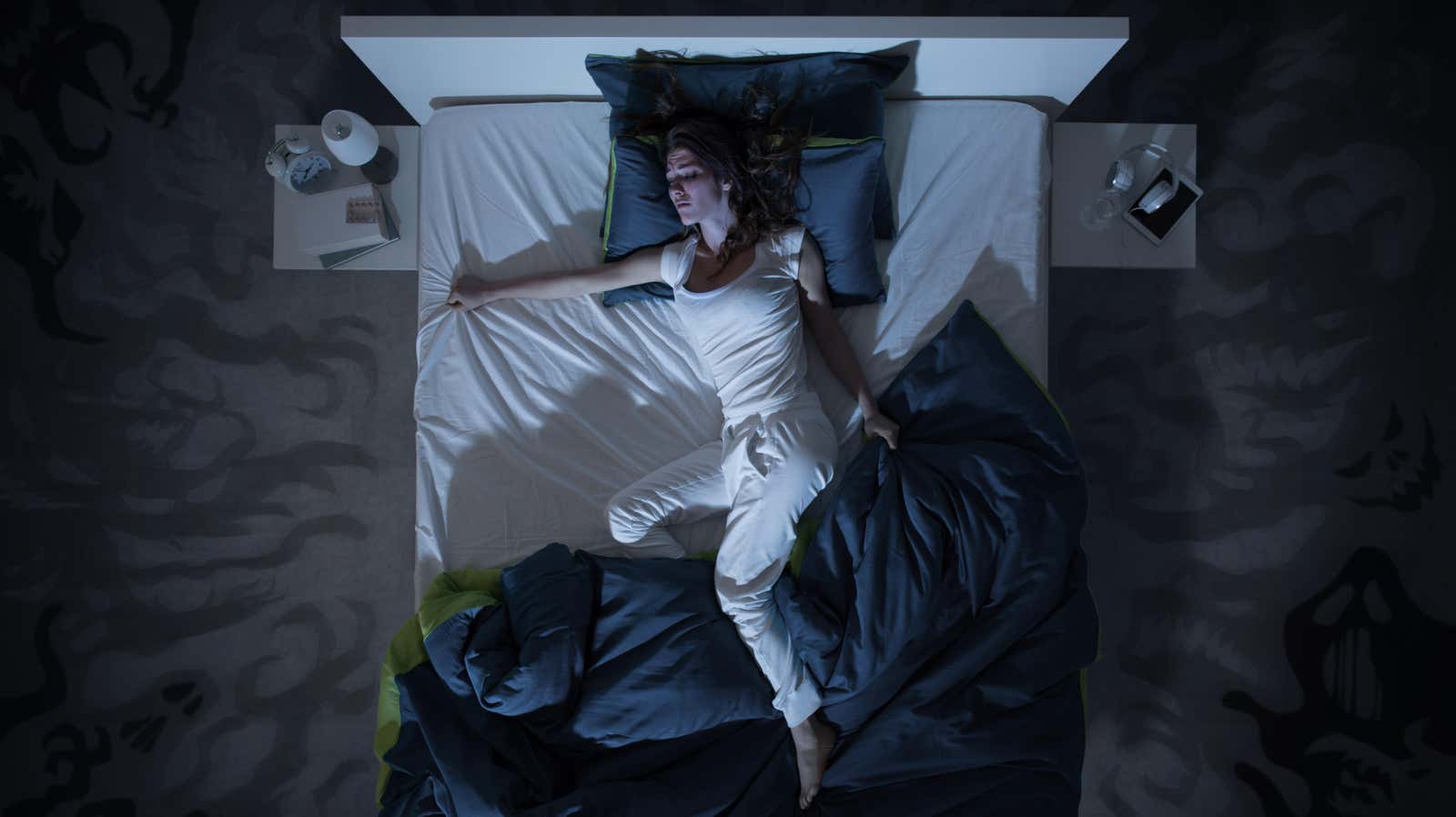Why You Have Night Sweats (and What You Can Do About It)

We all deserve a good night’s sleep, so it’s frustrating when sweating prevents us from getting the rest we need. If you’ve ever woken up in a sweat after a night of tossing and turning, you know how frustrating it can be. It’s one thing if you’re wearing flannel pajamas in the middle of summer (a bad choice), and quite another if you constantly wake up sweaty no matter what you’re wearing.
This may mean you need to see a doctor, but first there are some environmental and behavioral changes you can make to increase your chances of a cooler night’s rest.
Why do we even sweat at night?
“Our bodies sweat to expel waste products and help us cool down when we’re overheated,” says Noom nurse and trainer Christina Graham. “Sweat is 99% water and 1% salt and fat. We sweat all the time, even when we’re not hot and we’re not exercising. We sweat more when we overheat, losing anywhere from one quart to several liters per day depending on activity level and heat exposure.”
But why do some of us tend to sweat more at night than others?
“The circadian rhythm controls our sleep-wake cycle. As we approach sleep, our body temperature begins to drop, which signals the release of the sleep hormone melatonin,” says Graham. “Our core temperature drops throughout the night and then slowly rises in the morning when we wake up. Higher core temperatures can lead to difficulty falling asleep, restless sleep, and time delays in both slow wave and REM sleep, the deeper restorative stages of sleep.”
While sweating is an important and necessary physiological function, night sweats can lead to interrupted sleep and poor sleep quality, not to mention the discomfort and hassle of waking up in wet pajamas or sheets.
Below are the reasons why you might be sweating at night and how you can cool down so you can get a good night’s sleep.
Your clothes could be the culprit
Do you wear polyester, flannel or satin pajamas? They can retain body heat. And if you go to bed in socks, you should get rid of them too, as they also trap heat. According to Graham, you should choose cotton or other breathable fabrics like silk, or sweat-wicking pajamas. Or sleep naked.
Consider Your Sleep Environment
It may be obvious, but it’s important that your sleeping environment is cool, including room temperature, bedding, and who you may be sleeping next to.
“ Studies show that the ideal ambient temperature for sleep is 60-67 degrees, so setting the thermostat lower and keeping the bedroom cool can reduce the chance of night sweats,” says Graham. “A warm room, a cozy bed, or sleeping next to a partner or pets; this can raise the body’s core temperature and lead to sweating as the body tries to cool down before sleep.
Interestingly, according to Graham, slipping into warm sheets may initially help lower core temperature through heat and blood flow to the skin. “However, staying under a warm blanket for a long time can keep us warm and lead to nasty night sweats.”
To stay cool, you should buy cotton sheets and bedding with low thermal insulation. If you share a bed with a partner, you may want to purchase a duvet with different levels of insulation to suit each of you. If it gets too hot to sleep with your pet, consider getting him a bed on the floor or closing the door altogether.
You may need to adjust your lunch time
That bowl of pasta at night was delicious, but it can also cause night sweats.
“Eating large amounts of food within two hours of bedtime increases core body temperature because digestion requires energy,” says Graham. “It takes two to three hours for our food to digest, so make sure you have enough time to digest after your last meal to avoid food raising your core temperature.”
Ideally, the last meal of the day should be at least three hours before bedtime.
You may be training too late
You may enjoy a good night’s run, but it’s probably causing you more sweat than you intended.
“Exercise leads to an increase in body temperature, which leads to night sweats,” says Graham. “Post-workout, body temperature drops after a few hours, so it’s best to stick with morning, afternoon, or afternoon exercise.”
It could be hormonal
“Hormonal fluctuations can cause night sweats, especially decreased estrogen levels in perimenopausal or menopausal women,” says Graham. “It can also happen before or around ovulation, as estrogen and progesterone can interfere with body temperature control.”
Check with your doctor first to make sure this is exactly what is happening, and try changing your sleep patterns to a cooler room temperature and cool pajamas.
You may have a drug side effect (or infection)
“Some medications and health conditions can cause night sweats, so it’s important to talk to your health care provider if night sweats occur regularly and persist after making changes to your environment,” says Graham. “Some of the more common medications include antidepressants, hormone therapy, and drugs used to treat diabetes, which can cause hypoglycemic events.”
Fever and night sweats can also be signs of a possible infection, such as the flu or COVID-19, so if you have other symptoms.
“See your doctor if night sweats occur regularly, disrupt your sleep, or if you notice a fever, weight loss, fatigue, cough, or gastrointestinal symptoms,” Graham says. “If you’ve been suffering from night sweats that don’t seem to go away after making changes to your lifestyle or environment, it’s a good idea to talk to your doctor so they can investigate and rule out any serious causes.”